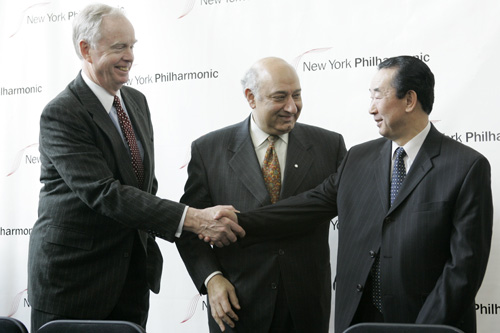NY Philharmonic to perform American songs in N. Korea

December 12, 2007
NEW YORK – When the New York Philharmonic plays in North Korea – a nation that President Bush has described as part of an “axis of evil” – the musical program will be steeped in Americana, complete with “The Star-Spangled Banner.”
At a news conference Tuesday to announce details of the historic visit, Zarin Mehta insisted the program was chosen because “it’s just great music.”
“We are not trying to send a political message,” Mehta, the orchestra’s president and executive director, told The Associated Press, adding, “You cannot go on isolating repressive regimes – talks have to start sometime.”
The orchestra will fly to the North Korea capital Pyongyang from Beijing on Feb. 25 for a 48-hour visit that will include master classes with North Korean musicians and an open rehearsal before a Feb. 26 evening performance. The Philharmonic has previously planned concerts in China, Hong Kong and Taiwan.
The program, chosen by the Philharmonic, starts with the national anthems of both countries, followed by Wagner’s Prelude to Act III of “Lohengrin,” Dvorak’s “New World Symphony” – written while the 19th century Czech composer lived in the United States – and Gershwin’s “An American in Paris.” The orchestra will be led by conductor Lorin Maazel.
Get The Daily Illini in your inbox!
The Philharmonic – the nation’s oldest orchestra – said it doesn’t yet have an estimate of the trip’s cost but doesn’t expect the U.S. government to contribute anything.
“This visit will surely deepen the understanding and cultural relations of the two countries,” North Korea’s U.N. Ambassador Pak Gil Yon said at the news conference.
The diplomat said he was “not in a position” to discuss whether North Korean leader Kim Jong Il would attend the concert or have any contact with the American musicians.
“I don’t have his personal schedule,” Pak said.
North Korea’s Ministry of Culture sent the orchestra an invitation in August. In October, Mehta spent six days in the reclusive nation exploring concert venues and making other arrangements for a potential visit.
That makes Mehta one of only a small number of Americans who have visited North Korea, which last year shocked the world by successfully testing a nuclear bomb.
“We approached the invitation with caution and with reservation,” Mehta said, adding that no decision was made until the State Department indicated that such a visit “would be beneficial.”
The North Koreans at first showed Philharmonic officials a 300-seat hall but the orchestra said it was too small. Finally, the hosts agreed to use the 1,500-seat East Pyongyang Grand Theatre, which Mehta said would be modified to improve the acoustics. Mehta said it was up to North Korea to decide how to distribute the tickets, and to whom.
The orchestra visit carries a risk that Kim will use it as propaganda, and some critics of the totalitarian regime worry that it offers legitimacy to one of the world’s most repressive societies.
Kim’s government has been accused of torturing and starving its people. Tensions reached a peak in October 2006, when North Korea tested a nuclear bomb. But relations have improved recently after the country agreed to disable its nuclear reactor and declare all nuclear programs by the end of this year.
In Washington, the State Department stressed the trip is private and downplayed its diplomatic significance.
“We have supported the New York Philharmonic in taking this decision, but it’s their decision to make,” said spokesman Sean McCormack, adding that the visit is not necessarily a sign of warmer government-to-government relations between the United States and North Korea, which he said depend on Pyongyang giving up its nuclear weapons programs.
The announcement of the musical diplomacy was greeted for the most part with rave reviews from scholars, Korean-Americans and human rights advocates who said the concert will promote openness in the Stalinist nation.






